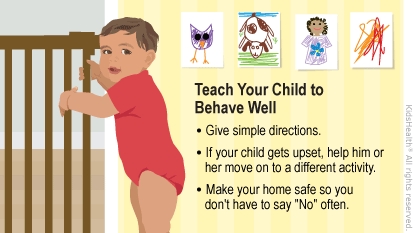Disciplining Your Toddler
Young children learn about their world by exploring. As part of that, they will break rules and try new behaviors. Discipline helps them understand which behaviors are OK and which are not. Use these strategies to help your child learn to manage their behavior.


Set a good example of how to act. Your child will learn a lot about behavior by watching what you do and how you interact with others.
Create a safe environment. Toddlers are naturally curious. Make your home and yard safe so you don't have to say "No" often. Remove dangerous objects from the house, like small items that could be choking hazards. Put cleaning supplies and medicines where toddlers can't grab them.
Enjoy time with your child. Sing, dance, and play together. Praise the activities you want them to do more. You could say, "I like the way you shared with your brother. That was very kind." This keeps your child involved in acceptable activities and lets them have your positive attention.
Help your child behave well. Try not to plan activities at times when your child might be tired or hungry. Don't overschedule your child. Give choices when you can. For example, "Do you want to wear the red shirt or the blue shirt?" If you notice your toddler getting upset, try to move on to another activity. For example, if your child gets frustrated with a toy, show them a different toy to play with or suggest doing something else, like going for a walk.
Be clear about rules. Explain rules in simple terms and be clear about what will happen if your toddler breaks a rule. You could say, "If you don't help with cleaning up, your toys will be put away for the rest of the day." If your toddler is hitting, biting, or out of control, a time-out may help. Time-outs should be short (about 1 minute for each year of age).

-
Your toddler has frequent temper tantrums that last longer than you would expect.
-
Your toddler hits or bites often.
-
You are having trouble coping with your toddler's behavior or worry you might hit or hurt your child.

Is it OK to use screen time to calm my toddler? Try not to use screens to soothe your child when they are upset. Teach them other ways to manage strong emotions, like taking deep breaths, cuddling with a favorite stuffed animal, or taking a time-out. Learning to calm themselves is an important part of a toddler's development.
Can I use spanking to discipline my toddler? It's important to not spank, hit, or slap a child of any age. Babies and toddlers especially aren't likely to make a connection between their behavior and physical punishment. They will only feel the pain of the hit.
What if I have a hard time coping with my child's behavior? All parents get frustrated with their toddlers from time to time. But if you're worried that you may hurt your child, put your toddler in a safe place like a crib and take a few minutes to calm down. If you still have trouble keeping calm, call a supportive friend or your health care provider for help.